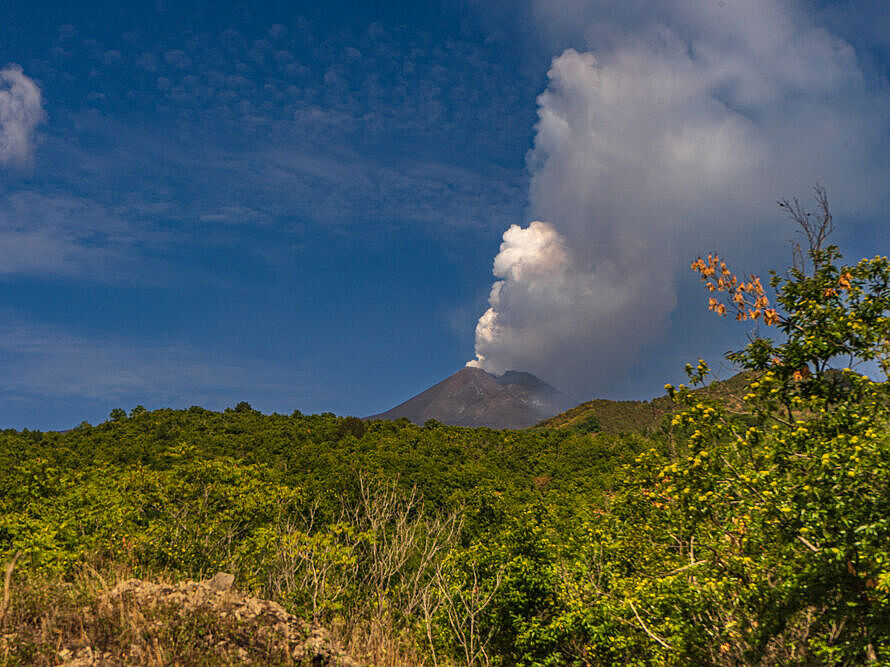Major volcanic eruptions not only have devastating effects on the ecosystem in their immediate vicinity, but also change the temperature of the atmosphere at altitudes of up to 100 km through radiation-driven and dynamic processes. The mechanism behind this process was previously unclear and accurate measurements were rare. The researchers at the University of Greifswald and the Max Planck Institute in Hamburg have used model simulations to try to elucidate the dynamic processes behind the expected temperature change in the summer hemisphere’s polar mesopause (at an altitude of approx. 80 - 100 km) in the aftermath of powerful volcanic eruptions.
The 1991 eruption of Mount Pinatubo in the Philippines was one of the most powerful eruptions of the last 100 years. Its impact on the stratosphere is well documented and understood. However, at that time, only limited ground or satellite-based measurements were available that were able to observe the temperature as far up as the mesopause (at an altitude of about 80 - 100 km). Some of these measurements reveal an interesting phenomenon: there is evidence of the mesopause warming up shortly after the volcanic eruption. The available data came from different types of measuring instruments, resulting in a high degree of uncertainty regarding both the strength and the timing of the signal.
The recently published study asked: which dynamic mechanism generated such a signal? A global circulation model with a high vertical distribution was used for this purpose. The simulated volcanic eruption was about twice as powerful as that of Pinatubo in 1991. The model shows a clear temperature rise in the mesopause above the summer pole about five months after the eruption. How does this happen? The dominant force seems to be wave-driven dynamic processes that have an effect from the lower stratosphere up into the mesosphere. This is plausible because the layers in the atmosphere are dynamically connected to each other. These processes mainly take place within the same hemisphere. However, there are indications that stratosphere conditions (at an altitude of approx. 10 - 50 km) on the winter side could also influence the summer mesopause, although the two are located on different hemispheres.
Why is this relevant? The summer mesopause is the coldest place in our atmosphere and under the right conditions, it allows noctilucent (night shining) clouds to form. These consist of ice particles which, with a little luck, can be seen as fragile glowing formations in the night sky during the summer months. Their existence and appearance depend on the temperature of the surrounding air. Powerful volcanic eruptions therefore have the potential to influence this natural phenomenon. Research on how exactly the properties of noctilucent clouds might change as a result is ongoing.
Further information
The research was carried out within the framework of the DFG Research Unit VolImpact (Volcanic impact on atmosphere and climate, FOR 2820), which is coordinated by the University of Greifswald’s Institute of Physics. https://physik.uni-greifswald.de/ag-von-savigny/projects/dfg-research-unit-volimpact-for-2820/
Publication
Wallis, S., Schmidt, H., and von Savigny, C.: Impact of a strong volcanic eruption on the summer middle atmosphere in UA-ICON simulations, Atmos. Chem. Phys., 23, 7001–7014, doi.org/10.5194/acp-23-7001-2023, 2023, Highlight paper / https://acp.copernicus.org/articles/23/7001/2023/
Media Photo
The photo is available on request from pressestelleuni-greifswaldde and can be used for free for editorial purposes in combination with this media release. If published, the author of the image must be named.
Contact at the University of Greifswald
Dr. Sandra Wallis
Institute of Physics
Felix-Hausdorff-Straße 6, 17489 Greifswald
Tel.: +49 3834 420 4718

